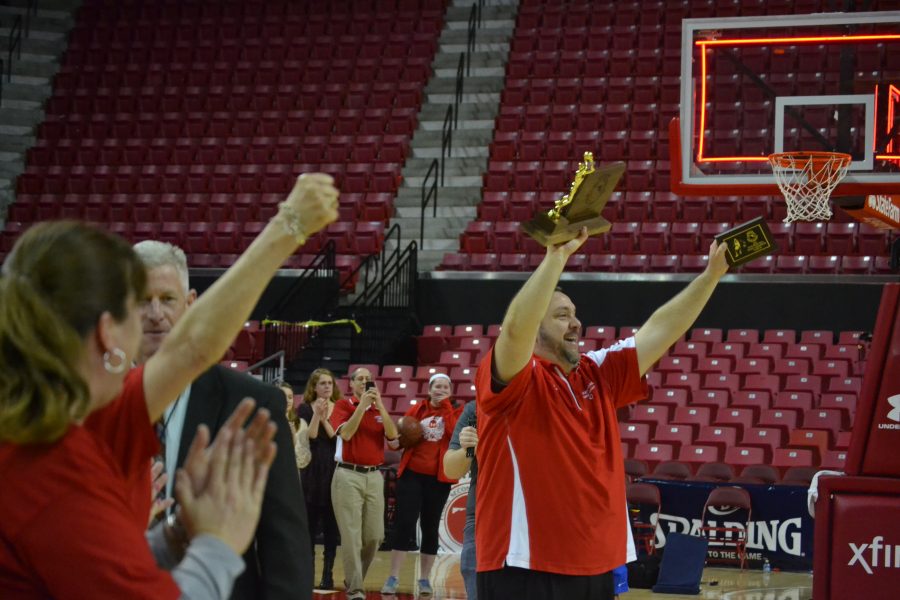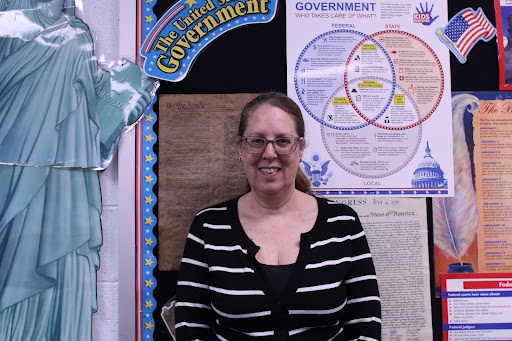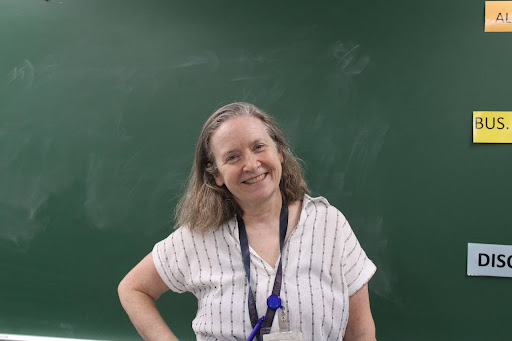Words: Caleb McClatchey
Photo contributed by: Wingspan Archives
When Chad Hollwedel switched his major from engineering to education, he knew that, wherever he taught, he wanted to have an impact on the school community beyond the classroom. With sports being a major part of his youth, he also knew that he wanted to coach.
However, what the 26-year-old Hollwedel didn’t know when he first started teaching at Centennial in 1997 was just how impactful his coaching would be. He didn’t know that he would help lead the basketball program to ten straight winning seasons. He didn’t know that his teams’ success would bring an entire school community together. He didn’t know that in 2015, with all of Centennial behind its back, his team would win the first boys basketball state title in school history. He didn’t know that his coaching would continue to influence and inspire his players years after they graduated. Now, twenty-two years later, with his coaching career finally coming to an end, Hollwedel knows. And so does Centennial.
When he first arrived at Centennial, Hollwedel wasted no time getting involved. In 1997, he joined the basketball program as an assistant for the Junior Varsity (JV) team. Hollwedel worked his way up the coaching ladder, serving as a Varsity assistant under head coach Jim Hill before taking over as head coach of the Junior Varsity team in the 2000–01 season. When Hill stepped down after the 2006–07 season, he felt confident leaving the program in the hands of Hollwedel.
Over the next twelve years, Hollwedel turned a historically inconsistent program into a model of consistency. After beginning his tenure with two losing seasons, Hollwedel led Centennial to ten straight winning seasons. His 193 career wins include three regional titles and one state championship.
Behind Hollwedel’s extraordinary success was his unwavering passion for the game. For twenty-two years, he devoted his life to the Centennial basketball program. For every hour of game the public watches, there are hours upon hours of practice to coach, meetings to hold, and film to watch. Factor in his off-season responsibilities and it’s easy to understand why, as Hollwedel put it, “Everything I did in my spare time was really [at Centennial].”
And while Hollwedel’s passion was evident in the amount of time he devoted to the program, it was how he coached in that time, and how much the program meant to him, which truly gave a sense of his incredible ardor.
Ben Goldsmith, a 2012 Centennial graduate, played for Hollwedel on the 2011 and 2012 regional championship teams. In Goldsmith’s eyes, Hollwedel’s greatest skill was the passionate attitude he coached with.
“He never had an off day,” Goldsmith recalled. “Whether it was an early Saturday morning practice or over holiday break, Hollwedel brought an energy to the gym.”
This energy —a general enthusiasm for the game and a demand for excellence— was contagious.
“It was easy to play our hearts out and enjoy doing it,” explained Goldsmith, “because we had a coach who was coaching his heart out and enjoying it too.”
For many of Hollwedel’s teams, the spirited, team-oriented culture which he developed translated into on-the-court success. In Goldsmith’s junior year, Hollwedel led Centennial past the regional finals and into the state final for the first time in school history. And although the 56–44 loss to Milford Mill in the championship hurt, making it there in the first place was an extremely rewarding accomplishment for Hollwedel.
The following year, Centennial won the regional title again and made it to the state tournament for the second year in a row. Having already been there and lost, Hollwedel felt that Centennial had to win this time. So when they came back empty-handed again —this time losing to Thomas Stone in the semi-final— there was a much greater feeling of failure for Hollwedel.
“That was personally devastating at the time,” he recalled. “I was just hoping to be able to get back.”
Three years later, after posting a 20–2 regular season record and on the heels of a dramatic win at the buzzer over River Hill in the regional final, Centennial got back. And this time, with the 2012 semi-final loss still weighing heavily on his shoulders, Hollwedel felt an even greater sense of urgency to win.
Nevertheless, he entered the state tournament at ease, confident that his team would finish what his 2011 team had started.
“After [the buzzer beater], I just felt like we were going to do it. Whether I had the right to believe we were going to do it or not, I believed we were going to.”
Centennial cruised past C. Milton Wright 75–61 in the semi-final, setting up a showdown with Westlake in the state championship. It’s a game which, one may argue, epitomized Hollwedel’s career.
Hundreds of fans greeted the Centennial players and coaches as they walked onto the Xfinity Center court before the game.
“It just looked like this mountain of red,” described Hollwedel. “It was overwhelming how many people were there.”
Making up that mountain were students, parents, teachers, alumni, and future Eagles– an entire community brought together by one basketball team. Hollwedel had built something which they all found hope in together, took pride in together, and celebrated together. From when the clock started ticking till the sound of the final buzzer, his team united them as Eagles.
Those Eagles cheered on, as loud and spirited as ever. Even as the two teams battled back and forth over the first three quarters, Hollwedel and Centennial never wavered. Then, with eight minutes left to decide whether they would make history or go home devastated, Centennial broke through.
Over the final quarter, Centennial outscored Westlake 20–9. As the clock hit 0:00, sealing a 57–43 win and the first state title in school history, the mountain of red erupted into a thunderous roar.
Shortly after the game ended, the announcer called up each of the players one-by-one to receive a plaque. As Hollwedel looked back on that moment a few weeks ago, the emotions of that day, the extraordinary significance of that win to him, his players, and the community, suddenly came flooding back.
“It was the happiest and most rewarding feeling that I’ve had as a coach,” he said, holding back tears. He searched for the right words to match the magic of that moment but could not find any. His voice shaky, all he could manage was “It was indescribable.”
When it was his turn to receive the state championship trophy, and the announcer officially pronounced the Eagles as Class 3A State Champions, Hollwedel turned and hoisted it triumphantly toward the Centennial crowd. Once again, they erupted in celebration.
In a way, that trophy was theirs as much as it was his. For years, the program and the community had fed off of and strengthened each other. Now, Hollwedel had brought the ultimate prize back to the community which put him there.
“It was truly a beautiful thing to witness,” remembered Isaiah White, a senior on the 2014–15 team. “Us playing as a team, and then him turning and pumping his fist into the crowd yelling ‘Let’s go!’”
It was not only in the community, however, that Hollwedel’s passionate coaching made a difference. It was in his players as well.
White, for instance, will never forget Hollwedel’s saying, “1–0.” One of Hollwedel’s points of emphasis, it meant players should focus on one game at a time rather than the season as a whole.
“It’s something that’s stuck with me throughout other aspects of my life,” he explained, “reminding me only to take care of what I can control, and to focus on the task at hand.”
After graduating from Centennial in 2015, White went on to play Division 1 basketball at the University of Maine. In addition to teaching him intangible lessons, White credits Hollwedel with coaching him the fundamentals and laying the foundation he needed to take the next step at the college level.
“I know for a fact that he helped get me where I am today,” concluded White.
Like White, Goldsmith also played basketball collegiately after graduating from Centennial. Now, Goldsmith is finishing his second year teaching at Leonardtown Middle School and coaching basketball at Leonardtown High School. Goldsmith says that without Hollwedel, he would have never chosen this career path.
“I try to model what I do after what Coach did at Centennial,” said Goldsmith. He aspires to develop a program at Leonardtown built on teamwork and determination just like Hollwedel did at Centennial.
As Goldsmith walks in the footsteps of Hollwedel, he ensures that Hollwedel’s message and attitude will continue to impact players and communities long after his retirement from coaching. His influence now extends beyond Centennial; he has forever changed the lives of his players and they are eager to have that same effect on others.
This year, Hollwedel is stepping away from the Centennial program. The possibility had been on his mind for years. After the 2018–19 season ended in March, Hollwedel spent time reflecting and ultimately decided that now was the right time.
Most importantly, Hollwedel felt that he was having trouble maintaining the passionate energy he believes is needed to run the program. He was a high energy coach who no longer had a high level of energy.
Also weighing into his decision was the opportunity to spend more time focusing on his family. His daughter, Emily, plays volleyball at Centennial and on a club team in the offseason. His son, Ryan, is planning on playing basketball at Hood College this winter. He is looking forward to spending more time watching and enjoying both of their athletic careers.
“I definitely just want to be a dad,” he explained.
While Hollwedel admits that it will be “extremely hard” to step away from something that has played such an important role in his life for the past twenty-two years, he doesn’t feel hesitant about his decision.
Hollwedel expects that stepping away from the basketball program will be similar to when he stepped away from coaching football. He noted that, even though Friday nights were tough for him at first, “It didn’t last very long. I still knew that I could enjoy it without being on the other side of the fence.”
With that being said, there are certainly some aspects of coaching that Hollwedel will miss. He says that the packed crowds, the thrill and emotion of the game, and the opportunity to grow relationships with his players all come to his mind.
In his twenty-two years at Centennial, coaching has become part of Chad Hollwedel’s identity. Visit him on any given day and you’ll likely find him in a Centennial basketball t-shirt, teaching in a classroom whose walls are lined with pictures and newspaper clippings of the program he helped build. He says he’ll miss having that as part of his identity, miss people saying “Hey, Coach” in the hallway. In a few years, he expects that there’ll be kids who never even knew he coached. And for an ordinary coach, that may be true. But Hollwedel’s coaching career was bigger than basketball. In turning the Centennial basketball program into a consistent winner, Hollwedel brought an entire community together. Through his passion and leadership, he made a difference in, often even changed, the lives of countless players. And so, even as Hollwedel steps away from the sideline, to all of those people whose lives he touched, whether they were part of the program or cheering it on, he will always be “Coach.”
th/ks/nk/nkg
This article is featured in the 2019 Takeover Issue. To see the full issue, Click Here!
For more breaking news and photos, follow The Wingspan on Instagram and Twitter @CHSWingspan.





